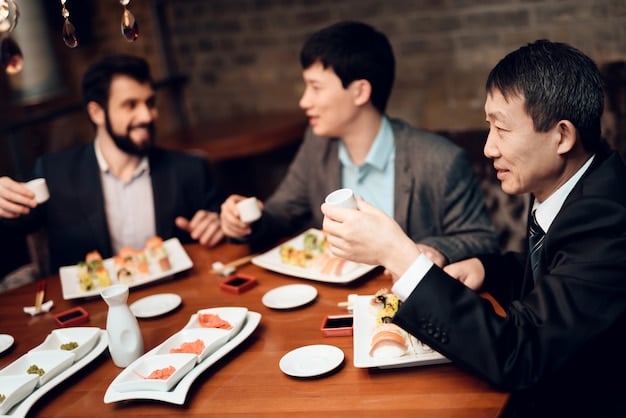Wa: Understanding Japanese Harmony for US Professionals in 2025

Understanding Japanese concepts of harmony, known as “Wa,” is crucial for US professionals in 2025 to foster effective communication, build strong relationships, and navigate business practices in Japan with cultural sensitivity and respect.
Navigating the intricate landscape of Japanese business culture requires more than just professional competence. Understanding Japanese Concepts of Harmony (Wa): A Guide for US Professionals in 2025 is essential for building strong relationships and fostering effective communication.
The Essence of Wa: Harmony Defined
At its core, “Wa” (和) refers to harmony, peace, and unity in Japanese culture. It’s a foundational principle that permeates social interactions, business practices, and even everyday life. Wa emphasizes the importance of maintaining a cooperative and respectful environment, where individual needs are balanced with the collective good.
Historical Roots of Wa
The concept of Wa has deep historical roots in Japan, tracing back to ancient Confucian and Buddhist philosophies. These traditions emphasize the importance of social order, respect for authority, and the pursuit of collective well-being. Understanding these roots provides a valuable context for appreciating the significance of Wa in modern Japanese society.
Wa in Daily Life
Wa is not just an abstract ideal; it is actively practiced in daily life. From carefully considering the needs of others in social situations to avoiding direct confrontation and maintaining a sense of decorum, Wa shapes how Japanese individuals interact with one another.

Key elements of Wa in daily life include:
- Prioritizing group harmony over individual expression.
- Using indirect communication to avoid conflict.
- Showing respect for seniority and hierarchy.
- Maintaining a calm and composed demeanor.
Understanding how Wa manifests in daily life provides a crucial foundation for navigating social and professional interactions in Japan. By being mindful of these nuances, US professionals can build rapport and avoid unintentional cultural missteps.
In essence, Wa is more than just harmony; it’s a holistic approach to life that emphasizes interconnection, respect, and a commitment to maintaining social equilibrium. Recognizing and respecting Wa is essential for building trust and fostering successful collaborations with Japanese colleagues.
Wa in Japanese Business Culture
The concept of Wa is deeply embedded in Japanese business culture, influencing everything from decision-making processes to negotiation strategies. For US professionals seeking success in Japan, understanding and adapting to this cultural nuance is paramount.
Decision-Making: Consensus and Collaboration
In contrast to the often top-down decision-making processes in the US, Japanese businesses typically emphasize consensus-building. Decisions are often made through a collaborative process called “ringi-sho,” where proposals are circulated among stakeholders for feedback and approval. This process can be time-consuming but ensures that all voices are heard and that decisions are aligned with the overall goals of the company.
Negotiation: Building Relationships and Trust
Negotiations in Japan are often viewed as opportunities to build long-term relationships rather than simply achieving short-term gains. Trust and mutual respect are essential components of successful negotiations. US professionals should be prepared to invest time in building rapport, demonstrating sincerity, and showing a genuine interest in the other party’s needs.
Key aspects of negotiations in Japan include:
- Emphasizing long-term partnerships over transactional deals.
- Using indirect communication and avoiding direct confrontation.
- Showing respect for seniority and hierarchy.
- Being patient and understanding the need for consensus.
Meetings: Etiquette and Protocol
Meetings in Japan are typically formal and structured, with a strong emphasis on etiquette and protocol. Punctuality is essential, and attendees should dress professionally and be prepared to exchange business cards (“meishi”) using proper etiquette. During the meeting, it’s important to listen attentively, avoid interrupting, and show respect for the speaker.
By being mindful of these cultural nuances, US professionals can demonstrate their respect for Japanese business practices and build strong, lasting relationships with their Japanese counterparts. Understanding Wa in business is not just about being polite; it’s about fostering a collaborative and productive environment where mutual success can be achieved.

Practical Steps for US Professionals in 2025
Successfully navigating the Japanese business landscape in 2025 requires US professionals to proactively embrace the concept of Wa and adapt their communication and interaction styles. Here are some practical steps to consider:
Learn Basic Japanese Phrases
Even a basic understanding of Japanese phrases can go a long way in demonstrating respect and building rapport. Simple greetings like “Konnichiwa” (hello) and “Arigato” (thank you) can create a positive impression and show that you are making an effort to connect with your Japanese colleagues on a personal level.
Master Business Card Etiquette (“Meishi”)
The exchange of business cards, known as “meishi,” is a formal ritual in Japan. Always offer and receive business cards with both hands, ensuring that the card is facing the recipient and is easily readable. Take a moment to examine the card before carefully placing it in a cardholder or on the table in front of you. Never write on a business card or put it in your pocket immediately after receiving it.
Embrace Indirect Communication
Direct communication, which is often valued in the US, can be perceived as blunt or disrespectful in Japan. Instead, embrace indirect communication, which relies on subtle cues, nonverbal signals, and context to convey meaning. Pay attention to body language, tone of voice, and the use of silence to understand the unspoken messages being communicated.
Show Respect for Hierarchy and Seniority
Japanese society places a strong emphasis on hierarchy and seniority. Always show respect for those who are older or in positions of authority. Address individuals by their titles (e.g., “President Tanaka”) and defer to their opinions and decisions. Avoid challenging authority or questioning decisions in public.
Be Patient and Adaptable
Building relationships and achieving success in Japan often requires patience and adaptability. Be prepared to invest time in building trust, understanding cultural differences, and adjusting your approach as needed. Avoid rushing into decisions or pushing for immediate results. Instead, focus on fostering long-term partnerships based on mutual respect and understanding.
Common Misunderstandings and Pitfalls
Despite earnest efforts, US professionals may encounter misunderstandings or cultural pitfalls when interacting with Japanese colleagues. Being aware of these potential challenges can help prevent awkward situations and foster more positive interactions.
Potential pitfalls include:
- Being overly direct or assertive in communication.
- Failing to show proper respect for hierarchy and seniority.
- Neglecting business card etiquette.
- Being impatient or pushing for immediate results.
Understanding the differences in communication styles and cultural norms is essential for avoiding unintentional offense. When in doubt, err on the side of formality and respect. Observing and learning from experienced colleagues can also provide valuable insights into navigating Japanese business culture effectively. Seeking feedback from Japanese colleagues on your communication style can also be helpful for continuous improvement.
The Future of US-Japan Collaboration: Embracing Wa
As the global business landscape continues to evolve, the importance of cross-cultural understanding and collaboration will only increase. For US professionals seeking to thrive in the Japanese market in 2025 and beyond, embracing the principles of Wa will be more critical than ever.
Cultivating Cultural Empathy
Developing cultural empathy – the ability to understand and appreciate the perspectives and experiences of others – is essential for successful cross-cultural collaboration. This involves actively seeking out opportunities to learn about Japanese culture, history, and values. It also requires a willingness to challenge your own assumptions and biases.
Building Stronger Relationships
Ultimately, the key to success in Japan lies in building strong, lasting relationships based on trust and mutual respect. This requires investing time in getting to know your Japanese colleagues on a personal level, showing genuine interest in their culture and perspectives, and demonstrating a commitment to long-term partnership.
Achieving Mutual Success
By embracing the principles of Wa, US professionals can foster a spirit of collaboration and achieve mutual success in the Japanese market. This not only benefits individual businesses but also strengthens the overall economic relationship between the United States and Japan. In 2025, those who prioritize understanding and respecting Japanese culture will be best positioned to thrive in this dynamic and important market.
| Key Concept | Brief Description |
|---|---|
| 🤝 Understanding Wa | Harmony, essential for successful interactions. |
| 🎎 Business Etiquette | Respectful behaviors in meetings and negotiations. |
| 🗣️ Communication | Indirectness is key to avoiding conflict. |
| 💼 Hierarchy | Respect for seniority is crucial in Japan. |
Frequently Asked Questions (FAQ)
▼
“Wa” (和) means harmony and is a principle that emphasizes peace, unity, and cooperation. It influences social interactions and business practices in Japan.
▼
Understanding Wa can help US professionals navigate Japanese business culture, build relationships, and communicate effectively, fostering successful collaborations.
▼
Japanese decision-making often involves a consensus-building process called “ringi-sho,” where proposals are circulated for feedback, ensuring all voices are heard.
▼
Avoid being overly direct, neglecting business card etiquette, and failing to show respect for hierarchy. Patience and adaptability are also essential.
▼
Learn basic Japanese phrases, master business card etiquette, embrace indirect communication, and respect hierarchy by addressing individuals by their titles.
Conclusion
For US professionals in 2025, understanding and embracing the Japanese concept of Wa is not just beneficial, it’s essential. By prioritizing harmony, respect, and cultural sensitivity, you can build stronger relationships, navigate business practices effectively, and achieve mutual success in the Japanese market.





